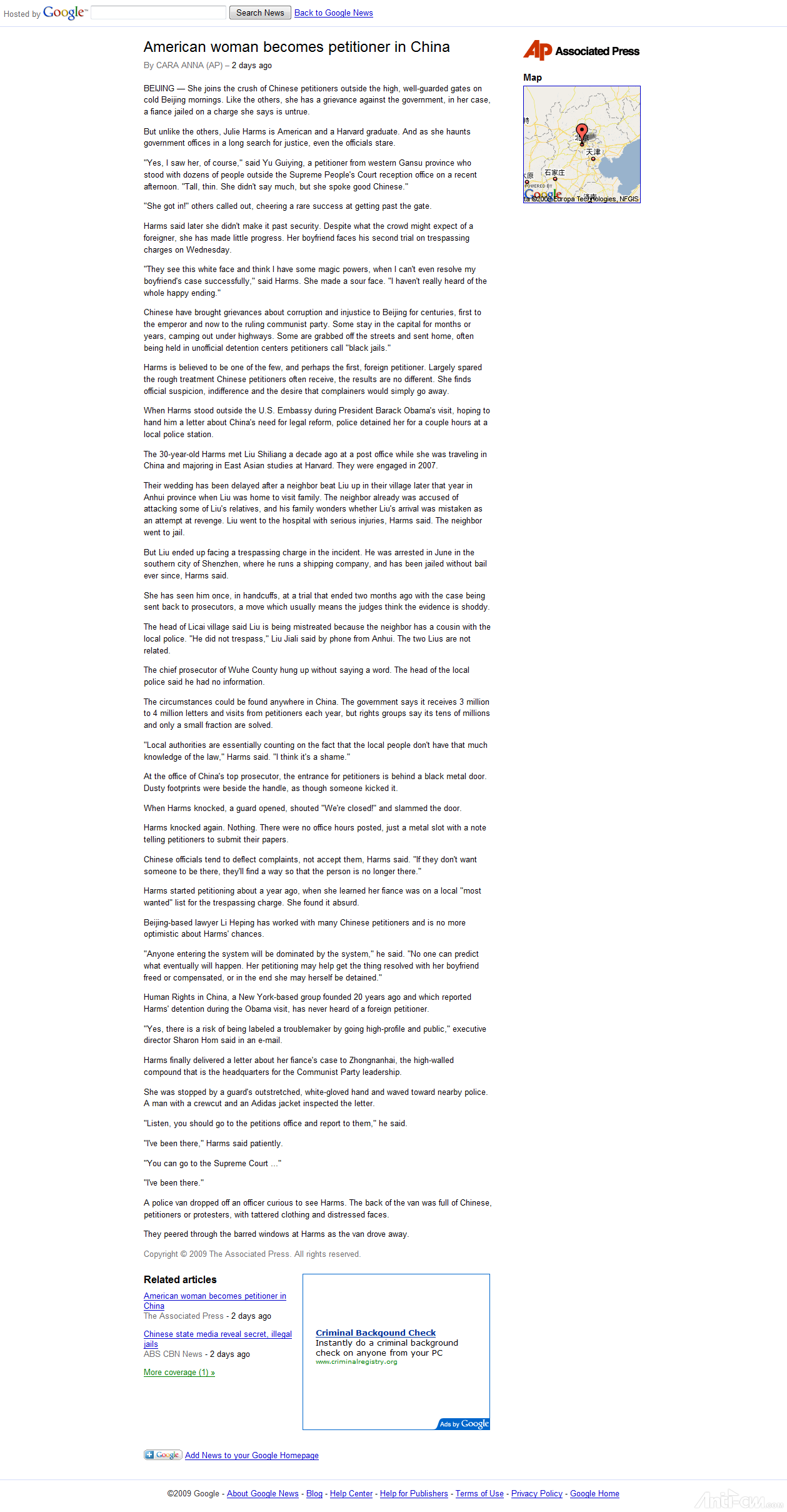|
|
【原文链接】http://www.google.com/hostednews ... VSzHvmssPwD9CALNQ80
【作者】CARA ANNA
【说明】《环球日报》的英文版对这个也有个深度报道,在(http://special.globaltimes.cn/2009-11/486844_8.html)
【原文】
BEIJING — She joins the crush of Chinese petitioners outside thehigh, well-guarded gates on cold Beijing mornings. Like the others, shehas a grievance against the government, in her case, a fiance jailed ona charge she says is untrue.
But unlike the others, Julie Harmsis American and a Harvard graduate. And as she haunts governmentoffices in a long search for justice, even the officials stare.
"Yes,I saw her, of course," said Yu Guiying, a petitioner from western Gansuprovince who stood with dozens of people outside the Supreme People'sCourt reception office on a recent afternoon. "Tall, thin. She didn'tsay much, but she spoke good Chinese."
"She got in!" others called out, cheering a rare success at getting past the gate.
Harmssaid later she didn't make it past security. Despite what the crowdmight expect of a foreigner, she has made little progress. Herboyfriend faces his second trial on trespassing charges on Wednesday.
"Theysee this white face and think I have some magic powers, when I can'teven resolve my boyfriend's case successfully," said Harms. She made asour face. "I haven't really heard of the whole happy ending."
Chinesehave brought grievances about corruption and injustice to Beijing forcenturies, first to the emperor and now to the ruling communist party.Some stay in the capital for months or years, camping out underhighways. Some are grabbed off the streets and sent home, often beingheld in unofficial detention centers petitioners call "black jails."
Harmsis believed to be one of the few, and perhaps the first, foreignpetitioner. Largely spared the rough treatment Chinese petitionersoften receive, the results are no different. She finds officialsuspicion, indifference and the desire that complainers would simply goaway.
When Harms stood outside the U.S. Embassy during PresidentBarack Obama's visit, hoping to hand him a letter about China's needfor legal reform, police detained her for a couple hours at a localpolice station.
The 30-year-old Harms met Liu Shiliang a decadeago at a post office while she was traveling in China and majoring inEast Asian studies at Harvard. They were engaged in 2007.
Theirwedding has been delayed after a neighbor beat Liu up in their villagelater that year in Anhui province when Liu was home to visit family.The neighbor already was accused of attacking some of Liu's relatives,and his family wonders whether Liu's arrival was mistaken as an attemptat revenge. Liu went to the hospital with serious injuries, Harms said.The neighbor went to jail.
But Liu ended up facing a trespassingcharge in the incident. He was arrested in June in the southern city ofShenzhen, where he runs a shipping company, and has been jailed withoutbail ever since, Harms said.
She has seen him once, in handcuffs,at a trial that ended two months ago with the case being sent back toprosecutors, a move which usually means the judges think the evidenceis shoddy.
The head of Licai village said Liu is being mistreatedbecause the neighbor has a cousin with the local police. "He did nottrespass," Liu Jiali said by phone from Anhui. The two Lius are notrelated.
The chief prosecutor of Wuhe County hung up without saying a word. The head of the local police said he had no information.
Thecircumstances could be found anywhere in China. The government says itreceives 3 million to 4 million letters and visits from petitionerseach year, but rights groups say its tens of millions and only a smallfraction are solved.
"Local authorities are essentially countingon the fact that the local people don't have that much knowledge of thelaw," Harms said. "I think it's a shame."
At the office ofChina's top prosecutor, the entrance for petitioners is behind a blackmetal door. Dusty footprints were beside the handle, as though someonekicked it.
When Harms knocked, a guard opened, shouted "We're closed!" and slammed the door.
Harmsknocked again. Nothing. There were no office hours posted, just a metalslot with a note telling petitioners to submit their papers.
Chineseofficials tend to deflect complaints, not accept them, Harms said. "Ifthey don't want someone to be there, they'll find a way so that theperson is no longer there."
Harms started petitioning about ayear ago, when she learned her fiance was on a local "most wanted" listfor the trespassing charge. She found it absurd.
Beijing-based lawyer Li Heping has worked with many Chinese petitioners and is no more optimistic about Harms' chances.
"Anyoneentering the system will be dominated by the system," he said. "No onecan predict what eventually will happen. Her petitioning may help getthe thing resolved with her boyfriend freed or compensated, or in theend she may herself be detained."
Human Rights in China, a NewYork-based group founded 20 years ago and which reported Harms'detention during the Obama visit, has never heard of a foreignpetitioner.
"Yes, there is a risk of being labeled a troublemakerby going high-profile and public," executive director Sharon Hom saidin an e-mail.
Harms finally delivered a letter about her fiance'scase to Zhongnanhai, the high-walled compound that is the headquartersfor the Communist Party leadership.
She was stopped by a guard'soutstretched, white-gloved hand and waved toward nearby police. A manwith a crewcut and an Adidas jacket inspected the letter.
"Listen, you should go to the petitions office and report to them," he said.
"I've been there," Harms said patiently.
"You can go to the Supreme Court ..."
"I've been there."
Apolice van dropped off an officer curious to see Harms. The back of thevan was full of Chinese, petitioners or protesters, with tatteredclothing and distressed faces.
They peered through the barred windows at Harms as the van drove away.
Copyright © 2009 The Associated Press. All rights reserved.

|
American, becomes, China, petitioner, woman, American, becomes, China, petitioner, woman, American, becomes, China, petitioner, woman
评分
-
1
查看全部评分
-
|